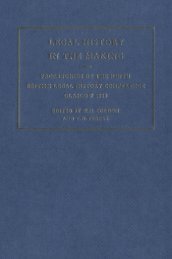130. - Collection Point® | The Total Digital Asset Management System
130. - Collection Point® | The Total Digital Asset Management System
130. - Collection Point® | The Total Digital Asset Management System
You also want an ePaper? Increase the reach of your titles
YUMPU automatically turns print PDFs into web optimized ePapers that Google loves.
210 Structure and the Book ofZechariah<br />
something for the sheep and sends a shepherd, who at first does his job<br />
properly, and gets rid of certain bad leaders.<br />
For some reason—almost certainly to do with their lack of response<br />
to him—the shepherd leaves the sheep to their fate. Almost certainly,<br />
we are meant to assume that they are left in the hands of their leaders.<br />
<strong>The</strong> failure of the shepherd to bring about a change in the attitude<br />
and situation of the sheep leads to the breaking of the staffs DJU and<br />
D**?3n, which have something to do with a covenant Yahweh has made,<br />
and the brotherhood between Israel and Judah. Probably this signifies<br />
that there will be disunity between the two parts of Israel, and that<br />
they will be at the mercy of other peoples.<br />
We can not be sure of the significance of the thirty shekels, or their<br />
ending up with the potter 1 in the Temple. <strong>The</strong>y represent at least the<br />
low value placed by either the 'traffickers in the sheep' or the 'poor of<br />
the flock' on the services of God's shepherd.<br />
In 11.15-17, we find a new stage in the story. <strong>The</strong> prophet is commanded<br />
to become a shepherd again, but this time he is to be actively<br />
bad. For this he is himself to be punished. We are accustomed to reading<br />
that Yahweh uses evil instruments for his purposes (cf. Isa. 10.5-<br />
19; Hab. 1.5-6) or that he uses Cyrus, 'although he does not know'<br />
God (Isa. 45.5), to achieve what he wants. It is quite different to read<br />
that a prophet is commanded to do something evil. <strong>The</strong> closest parallel<br />
is probably the ironic speech of Micaiah in 1 Kgs 22.19-23, or<br />
Ezek. 20.25-26. <strong>The</strong> section ends with a totally bleak picture.<br />
In 13.7-9, as we have seen from the parallels, the position is taken<br />
up from where it was at the end of 11.17. Are we to assume that the<br />
sword is against him because he has not done his job properly? <strong>The</strong><br />
text does not say this; in fact the emphasis is on the relationship<br />
between Yahweh and the shepherd: this time *m definitely means 'my<br />
shepherd', and Tnar confirms it. A severe double refining process is<br />
described at the end of which the relationship between Yahweh and<br />
1. <strong>The</strong> reading iicvn *?K has occasioned difficulty. Syr. reads •UttRn, the<br />
treasury, and it is felt that this is more easily understandable, especially in the light of<br />
the nvr m before the second mention of the phrase. LXX, 'A, I, L and Matt. 27.10<br />
support MT, which should be accepted. <strong>The</strong>re is a difference of opinion as to whether<br />
this means 'potter' or 'founder'. C.C. Torrey (<strong>The</strong> Foundry of the Second Temple<br />
at Jerusalem', JBL 55 [1936], pp. 247-60) argued that the word refers to the official<br />
in charge of the foundry. Further see Rudolph, Haggai, pp. 202-203; Saeb0, 'Die<br />
deuterosacharjanische Frage', pp. 78-83.






